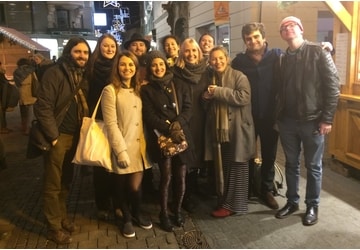In early December of 2018, I had the great privilege of being able to attend a conference on science fiction studies in Graz, Austria, entitled ‘Worlding SF: Building, Inhabiting and Understanding SF Universes’. It was put on by the American Studies department at the University of Graz, and featured three days of parallel panels, three keynote speeches (by Mark Bould, Cheryl Morgan and Gerry Canavan), and a few additional programme points. The panels were grouped under headings such as ‘Worldbuilding beyond Storytelling’, ‘Beyond Petromodernity’, and ‘Imagining Non-Binary Futures’, and it was very difficult to decide which of the panels to attend; however, the papers that I managed to hear were all very interesting and often quite useful to my own research. Also, I was particularly intrigued by one of the keynote speeches, by Gerry Canavan, which dealt with the rising phenomenon of climate fiction, an area closely related to my work.
Apart from the literary content, the additional events included presentations by members of the Austrian Space Forum, which were all fascinating: we learned about the Austrian government’s preparations for putting astronauts on Mars, for example, and also received a first-hand account by a scientist who searches for life on other planets. I particularly appreciated the organisers’ attempts to bridge the gap between science and fiction, which is not often the case at science fiction events.
 After the end of the conference, several of the participants took some time to explore Graz a little more and make use of its cultural offerings; some friends and I went to see an exhibition on Afrofuturism at the main art museum in the city, which tied in nicely with the research we had been discussing.
After the end of the conference, several of the participants took some time to explore Graz a little more and make use of its cultural offerings; some friends and I went to see an exhibition on Afrofuturism at the main art museum in the city, which tied in nicely with the research we had been discussing.
How the award has helped my personal development:
As mentioned, several of the papers that I was able to attend were very relevant indeed to my own research, and will help me in finishing my thesis in the next couple months as well as in preparing publications in the period that follows. Papers that I found particularly useful included an interdisciplinary talk by Grant Dempsey on ‘The Ontological Complexity of SF and its Worlds’; an engaging presentation by architect Amy Butt on ‘The City as Social Structure’ in Ursula K Le Guin’s The Dispossessed, which I am also writing on; and a well-structured talk by Chris Pak on ‘Modelling Science Fiction’s Environmental Futures’, which relates directly to my own work on science fiction texts as interactive models.
Moreover, I presented a paper myself, within the ‘Greening SF’ panel; my paper was entitled ‘A Utopia Without Us: Ecofeminism, the Anthropocene, and the Paradox of the Non-Human Utopia’, and it dealt with the hierarchical and ethically dubious relationships between human and non-human inhabitants of utopian societies in recent feminist utopian novels, before going on to entertain the idea that a utopian society might actually work better if there are no humans within it at all. Drawing on complexity theory, ecofeminist philosophy, and Alan Weisman’s The World Without Us, I then suggested that such a separation is in fact not only unfortunate from a human perspective, but in fact counterproductive given the proven sustainability and self-improving nature of complex adaptive systems, which certain other recent feminist utopias tend towards in their structure and content.
Having not attended a conference in several months due to PhD work, I found it very helpful indeed to clarify some recent ideas; in addition, I found it very useful and stimulating to present them to an audience of respected science fiction scholars, some of whom had very insightful feedback to offer on my paper.
What this award has helped me achieve:
Once again, the act of writing and presenting this paper helped me to streamline my thoughts on my current research, which is helping me complete my PhD more efficiently; in addition, attending other people’s presentations filled gaps in my knowledge with information that I am now able to employ for my own work.
Lastly, the interpersonal value of ‘Worlding SF’ was very great, as well – the academic conversations I had with peers and superiors are already improving my work, and simply having participated as an active member in my own academic research community will certainly be of value for my upcoming job applications, since more people will be familiar with the themes and quality of my writing.
As such, I am very grateful indeed to Hatfield College for the opportunity to attend this conference through this generous MCR Research Award, and I can assure you that the money has been put to good use.